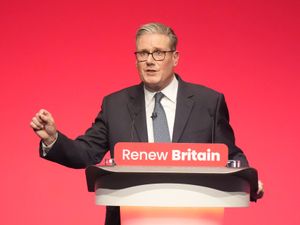Politics
Starmer Proposes Review of Human Rights Law to Tackle Asylum Crisis

Sir Keir Starmer has committed to reviewing how UK courts interpret human rights law regarding asylum cases, aiming to address the issue of small boats crossing the English Channel, which he referred to as “Farage boats.” The Prime Minister emphasized that while international laws, including the European Convention on Human Rights (ECHR), will not be dismantled, the interpretations applied by the courts may undergo scrutiny to limit asylum claims.
Starmer intensified his criticism of Nigel Farage, leader of Reform UK, who advocates for the UK to exit the ECHR and other international agreements. He countered Farage’s assertion that leaving the European Union would not impact migration policy, referencing the Dublin Convention, which previously allowed the UK to return certain asylum seekers to EU countries. “Before we left the EU, we had a returns agreement with every country in the EU… He was wrong about that,” Starmer stated in an interview with GB News.
The Prime Minister reaffirmed his support for the ECHR and other international protections, insisting they should be applied within the contemporary context. During an appearance on BBC Radio 4’s Today programme, he remarked, “We’re seeing mass migration in a way that we haven’t seen in previous years.” Starmer expressed his belief that individuals genuinely fleeing persecution deserve asylum, describing it as a compassionate act. Nevertheless, he called for a reassessment of how specific provisions are interpreted, rather than dismantling them entirely.
Legal Interpretations and Asylum Claims
Starmer highlighted Articles 3 and 8 of the ECHR, which pertain to protection from torture and the right to private and family life, as particularly relevant to the ongoing discussions about deportation efforts. Cabinet Minister Pat McFadden indicated that the government would examine the interpretation of these articles while maintaining adherence to the convention. He explained, “If someone is to be deported, the protection is against torture. But is it really torture if the prison conditions or some other conditions in that country don’t meet British standards? Most people would say that wasn’t torture.”
The Work and Pensions Secretary attributed the difficulties in deporting migrants arriving in small boats to Brexit, noting the loss of the Dublin agreement and the need to establish new returns agreements with other countries. McFadden stated, “As a consequence of leaving the European Union: no Dublin agreement, no agreement at all, not even an imperfect one.” He acknowledged ongoing efforts to collaborate with France and other nations to address the situation.
Starmer’s comments follow a speech at the Labour Party conference where he placed immigration control, economic growth, and national pride at the forefront of his strategy to confront Farage’s Reform UK. He asserted that securing borders is a “reasonable demand,” but criticized those, including Farage, whom he accused of crossing a “moral line” concerning migration policy.
The Labour leader and his colleagues have consistently labeled Reform’s proposal to revoke the right to remain for certain legally residing migrants as “racist” and “immoral.” Starmer clarified that he does not consider Farage or his supporters to be racist, stating, “They’re concerned about things like our borders, they’re frustrated about the pace of change.” He added that he was specifically addressing a particular policy that would result in the deportation of lawful migrants, which he believes could “tear our country apart.”
While acknowledging Farage as a “formidable politician,” Starmer refrained from directly labeling him as appealing to racists. He noted that minority communities in the UK have expressed unease about the current political climate, saying they feel a “shiver down their throat” in response to ongoing discussions about migration.
The Labour Party conference is set to conclude on Wednesday with speeches from Environment Secretary Emma Reynolds and Energy Secretary Ed Miliband, as the party continues to shape its stance on immigration and human rights law in the UK.
-

 Health3 months ago
Health3 months agoNeurologist Warns Excessive Use of Supplements Can Harm Brain
-

 Health3 months ago
Health3 months agoFiona Phillips’ Husband Shares Heartfelt Update on Her Alzheimer’s Journey
-

 Science1 month ago
Science1 month agoBrian Cox Addresses Claims of Alien Probe in 3I/ATLAS Discovery
-

 Science1 month ago
Science1 month agoNASA Investigates Unusual Comet 3I/ATLAS; New Findings Emerge
-

 Science4 weeks ago
Science4 weeks agoScientists Examine 3I/ATLAS: Alien Artifact or Cosmic Oddity?
-

 Entertainment4 months ago
Entertainment4 months agoKerry Katona Discusses Future Baby Plans and Brian McFadden’s Wedding
-

 Science4 weeks ago
Science4 weeks agoNASA Investigates Speedy Object 3I/ATLAS, Sparking Speculation
-

 Entertainment4 months ago
Entertainment4 months agoEmmerdale Faces Tension as Dylan and April’s Lives Hang in the Balance
-

 World3 months ago
World3 months agoCole Palmer’s Cryptic Message to Kobbie Mainoo Following Loan Talks
-

 Science4 weeks ago
Science4 weeks agoNASA Scientists Explore Origins of 3I/ATLAS, a Fast-Moving Visitor
-

 Entertainment4 months ago
Entertainment4 months agoLove Island Star Toni Laite’s Mother Expresses Disappointment Over Coupling Decision
-

 Entertainment3 months ago
Entertainment3 months agoMajor Cast Changes at Coronation Street: Exits and Returns in 2025









